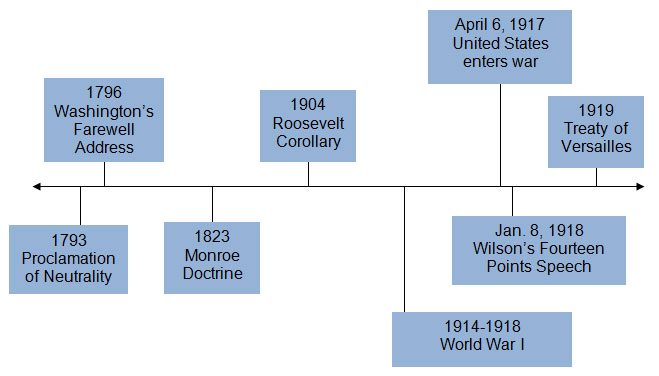

In his Farewell Address, George Washington outlined foreign policy principles that the United States would follow for roughly the next 150 years of its history. He strongly warned the United States to avoid entangling alliances with other nations. If the United States made permanent agreements, he believed that the United States would simply get drawn into the problems of Europe, without any real benefit to our country. Instead, Washington encouraged the nation to act with good faith and justice to everyone and trade with everyone. The United States would not agree to a permanent, entangling alliance until it joined the North Atlantic Treaty Organization in 1949.
Read the following excerpt from President Woodrow Wilson's Fourteen Points Speech delivered on January 8, 1918, following the United States's entry into World War I. How does his message align or differ from the precedent established by George Washington in 1796? What reasons does he give for US participation in WWI? How do these reasons redefine US foreign relations? Record your answers in your notes.
We entered this war because violations of right had occurred which touched us to the quick and made the life of our own people impossible unless they were corrected and the world secured once and for all against their recurrence.
What we demand in this war, therefore, is nothing peculiar to ourselves. It is that the world be made fit and safe to live in; and particularly that it be made safe for every peace-loving nation which, like our own, wishes to live its own life, determine its own institutions, be assured of justice and fair dealing by the other peoples of the world, as against force and selfish aggression.
All the peoples of the world are in effect partners in this interest, and for our own part we see very clearly that unless justice be done to others it will not be done to us.
- Excerpted from Fourteen Points Speech by Woodrow Wilson on January 8, 1918
President Wilson's Message to Congress, January 8, 1918; Records of the United States Senate; Record Group 46; Records of the United States Senate; National Archives.
In 1823, James Monroe issued a statement to the world, known as the Monroe Doctrine. In it, President Monroe declared U.S. opposition to European interference in the Americas. The policy announced that the United States would use force, if necessary, to protect the Western Hemisphere from European aggression. The rationale of the Monroe Doctrine was used to support American intervention in the Spanish colony of Cuba in 1898. In 1904, Theodore Roosevelt added the Roosevelt Corollary to the Monroe Doctrine. The Corollary asserted the right of the United States to intervene in Latin America in cases of "flagrant and chronic wrongdoing by a Latin American Nation."
In your notes, answer the following questions: